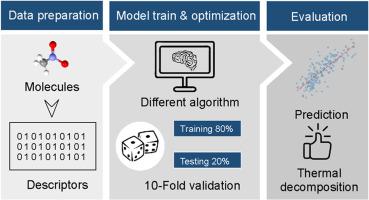Energetic Materials Frontiers Pub Date : 2023-09-04 , DOI: 10.1016/j.enmf.2023.09.001 Jun-nan Wu , Si-wei Song , Xiao-lan Tian , Yi Wang , Xiu-juan Qi

|
Exploring the application of machine learning (ML) in energetic materials (EMs) has been a hot research topic. Accordingly, the prediction of the detonation properties of EMs using ML methods has attracted much attention. However, the predictive models for the thermal decomposition temperatures (Td) of EMs have been scarcely reported. Furthermore, the small datasets used in these reports lead to a weak generalization ability of the predictive models. This study created a dataset containing 1022 energetic molecules with Td values of 38–425 °C and determined an optimal predictive model through training. The gradient boost machine for regression (GBR) model yielded a coefficient of determination (R2) of 0.65 and a mean absolute error (MAE) of 27.7 for the test set. This study further explored critical features, determining that the prediction accuracy of the models was significantly influenced by descriptors representing molecular bond stability (i.e., the BCUT metrics) and atomic composition (i.e., the Molecular ID). Finally, the analysis of the outlier structure indicated that the model accuracy can be further improved by incorporating features related to molecular interactions. The results of this study help gain a deep understanding of the application of ML in the prediction of EM properties, particularly in dataset construction and feature selection.
中文翻译:

基于机器学习的含能材料分解温度预测和解释
探索机器学习(ML)在含能材料(EM)中的应用一直是一个热门研究课题。因此,利用机器学习方法预测电磁爆炸特性引起了广泛关注。然而, EMs热分解温度( T d )的预测模型却鲜有报道。此外,这些报告中使用的小数据集导致预测模型的泛化能力较弱。这项研究创建了一个包含 1022 个T d值为 38-425 °C 的高能分子的数据集,并通过训练确定了最佳预测模型。回归梯度提升机 (GBR) 模型的决定系数 ( R 2 ) 为 0.65,测试集的平均绝对误差 (MAE) 为 27.7。这项研究进一步探讨了关键特征,确定模型的预测准确性受到代表分子键稳定性(即 BCUT 指标)和原子组成(即分子 ID)的描述符的显着影响。最后,对离群结构的分析表明,通过纳入与分子相互作用相关的特征可以进一步提高模型的准确性。这项研究的结果有助于深入了解机器学习在电磁特性预测中的应用,特别是在数据集构建和特征选择方面。



























 京公网安备 11010802027423号
京公网安备 11010802027423号